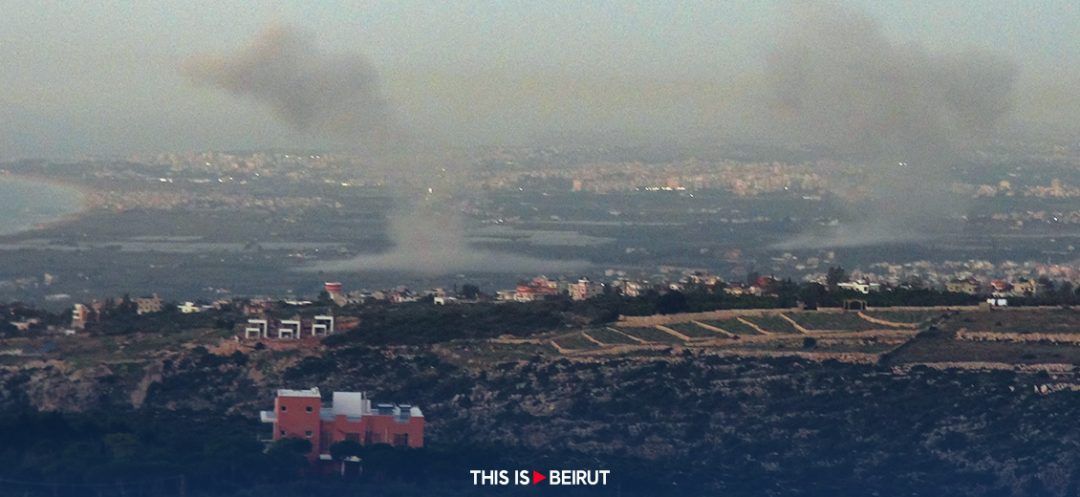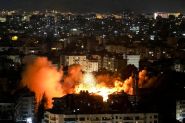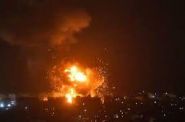- Home
- War in the Middle East
- Israel’s Infiltration of the South: What Does It Imply?

Amid relentless and heightening cross-border confrontations between Hezbollah and the Israeli Army over more than three months, Israel announced on Tuesday, January 16, that its special forces infiltrated southern Lebanon and removed mines in the village of Aita al-Shaab.
The move was coupled with threats that came in the form of leaflets dropped over the village of Kfar Kila, warning south Lebanon’s residents of a harsh response if they collaborated with Hezbollah.
Although it was denied by Hezbollah, the Israeli announcement essentially implied that Israeli troops could infiltrate the border, step into Lebanese territory, conduct demining operations, which could take a few hours, and return to their base undetected.
Though it is lined with barbed wires and surveillance equipment, the border is porous and can be infiltrated in both directions, according to retired Lebanese Army General Maroun Hitti.
“Technically and militarily speaking, it is easy to infiltrate the border. There is always a leak somewhere, despite the obstacles,” Hitti told This is Beirut.
By doing so, Israel has in fact dealt a blow to Hezbollah and the government that provides it with political coverage, since the Iran-backed party is effectively the one controlling the border instead of the Lebanese Army and UNIFIL, Hitti maintained.
Shift in Israeli Strategy
He said, “Strategically, it implies that Israel has shifted from a passive engagement or one-to-one retaliation to a more aggressive strategic posture. What happened at Aita al-Shaab (if it is true) is susceptible to be repeated anywhere else on the porous frontier, and it means that Israel can transfer the conflict inside Lebanese territory."
The operation could also be interpreted as a prelude to a land offensive, though such an option is “absurd” and “unlikely,” according to Hitti.
“One can suggest that by demining the area near Aita al-Shaab, Israel has opened a corridor amid a minefield to clear the path for boots on the ground,” the retired general said, adding: “The infiltration could also be seen as a tactical intimidation move, which can translate into ‘this time we removed the mines, but the next time we would enter Lebanon’.”
Psychological Warfare
Dubai-based military expert Riad Kahwaji pointed out that Israel’s special forces are trained to carry out operations behind enemy lines and could infiltrate Lebanon’s southern border.
He told This is Beirut that the operation in Aita al-Shaab should be assessed depending on its ultimate objective. “If the objective was really to clear mines, it could indicate that Israel is setting the stage for a land operation. However, they could be doing this as part of psychological warfare and to make the threat look more real and credible… only time will tell.”
The operation carries a political message as well, according to Hitti. “It is a message of determination that implies that Israel is resolute on achieving the political objectives that it has set,” namely, to push Hezbollah’s threat away from its colonies near Lebanon’s border.”
“Such a move or infiltration (if it happened) is essentially a political decision taken at the highest political level,” he added.
The fast-developing regional tensions linked to the raging war in Gaza, which erupted following Hamas’ unprecedented attack against Israel, dubbed the “al Aqsa Flood” operation, are amplifying the risks of a regional conflagration involving Iran-backed players of the so-called “axis of resistance,” ranging from Lebanon to Syria, Iraq, and Yemen.
The Region Is Already at War
“Nowadays, wars are not conducted by belligerents facing each other like in the past,” Hitti said. “There is a new way of conducting warfare, which is mostly surgical, but its flares are quite obvious. All friction lines in the region are being ignited, be they on land, sea, or through long-range ballistic missiles like the ones fired by Iran at Erbil.”
Commenting on the regional escalation, Kahwaji asserted that “all fronts are open, which naturally means that escalation could reach a bigger confrontation.”
He said Iran’s strike on Erbil meant that Tehran could also carry out long-range strikes, just like the Americans do in Iraq, Yemen, and Syria.
“Iraq, Syria, Lebanon, and Yemen are theaters of confrontations that Iran is using to project power and as a means of extortion, trying to present itself as a solution to the problems,” Kahwaji said, noting, however, that such an approach could backfire “because of the risk of sliding into an all-out confrontation, much bigger than what Iran would hope.”
“But if the objective of the operations of the Iranian-backed ‘axis of resistance’ is to ease the offensive on Gaza or stop it, it has definitely failed!” he added.
The move was coupled with threats that came in the form of leaflets dropped over the village of Kfar Kila, warning south Lebanon’s residents of a harsh response if they collaborated with Hezbollah.
Although it was denied by Hezbollah, the Israeli announcement essentially implied that Israeli troops could infiltrate the border, step into Lebanese territory, conduct demining operations, which could take a few hours, and return to their base undetected.
Though it is lined with barbed wires and surveillance equipment, the border is porous and can be infiltrated in both directions, according to retired Lebanese Army General Maroun Hitti.
“Technically and militarily speaking, it is easy to infiltrate the border. There is always a leak somewhere, despite the obstacles,” Hitti told This is Beirut.
By doing so, Israel has in fact dealt a blow to Hezbollah and the government that provides it with political coverage, since the Iran-backed party is effectively the one controlling the border instead of the Lebanese Army and UNIFIL, Hitti maintained.
Shift in Israeli Strategy
He said, “Strategically, it implies that Israel has shifted from a passive engagement or one-to-one retaliation to a more aggressive strategic posture. What happened at Aita al-Shaab (if it is true) is susceptible to be repeated anywhere else on the porous frontier, and it means that Israel can transfer the conflict inside Lebanese territory."
The operation could also be interpreted as a prelude to a land offensive, though such an option is “absurd” and “unlikely,” according to Hitti.
“One can suggest that by demining the area near Aita al-Shaab, Israel has opened a corridor amid a minefield to clear the path for boots on the ground,” the retired general said, adding: “The infiltration could also be seen as a tactical intimidation move, which can translate into ‘this time we removed the mines, but the next time we would enter Lebanon’.”
Psychological Warfare
Dubai-based military expert Riad Kahwaji pointed out that Israel’s special forces are trained to carry out operations behind enemy lines and could infiltrate Lebanon’s southern border.
He told This is Beirut that the operation in Aita al-Shaab should be assessed depending on its ultimate objective. “If the objective was really to clear mines, it could indicate that Israel is setting the stage for a land operation. However, they could be doing this as part of psychological warfare and to make the threat look more real and credible… only time will tell.”
The operation carries a political message as well, according to Hitti. “It is a message of determination that implies that Israel is resolute on achieving the political objectives that it has set,” namely, to push Hezbollah’s threat away from its colonies near Lebanon’s border.”
“Such a move or infiltration (if it happened) is essentially a political decision taken at the highest political level,” he added.
The fast-developing regional tensions linked to the raging war in Gaza, which erupted following Hamas’ unprecedented attack against Israel, dubbed the “al Aqsa Flood” operation, are amplifying the risks of a regional conflagration involving Iran-backed players of the so-called “axis of resistance,” ranging from Lebanon to Syria, Iraq, and Yemen.
The Region Is Already at War
“Nowadays, wars are not conducted by belligerents facing each other like in the past,” Hitti said. “There is a new way of conducting warfare, which is mostly surgical, but its flares are quite obvious. All friction lines in the region are being ignited, be they on land, sea, or through long-range ballistic missiles like the ones fired by Iran at Erbil.”
Commenting on the regional escalation, Kahwaji asserted that “all fronts are open, which naturally means that escalation could reach a bigger confrontation.”
He said Iran’s strike on Erbil meant that Tehran could also carry out long-range strikes, just like the Americans do in Iraq, Yemen, and Syria.
“Iraq, Syria, Lebanon, and Yemen are theaters of confrontations that Iran is using to project power and as a means of extortion, trying to present itself as a solution to the problems,” Kahwaji said, noting, however, that such an approach could backfire “because of the risk of sliding into an all-out confrontation, much bigger than what Iran would hope.”
“But if the objective of the operations of the Iranian-backed ‘axis of resistance’ is to ease the offensive on Gaza or stop it, it has definitely failed!” he added.
Read more



Comments